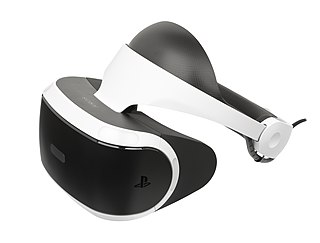
Virtual reality (VR) is a simulated experience that employs 3D near-eye displays and pose tracking to give the user an immersive feel of a virtual world. Applications of virtual reality include entertainment, education and business. VR is one of the key technologies in the reality-virtuality continuum. As such, it is different from other digital visualization solutions, such as augmented virtuality and augmented reality.
The University of Southern California's School of Cinematic Arts's Interactive Media & Games Division first accepted M.F.A. students in 2002. The division currently offers both undergraduate (B.F.A.) and graduate programs in interactive media and game design, as well as B.F.A. programs in game art and themed entertainment and an M.A. in media, games and health. The programs include courses in game design, game development, production, audio, animation, and user research as well as experimental work in gestural and immersive interfaces, transmedia design, and interactive cinema.

Immersion into virtual reality (VR) is the perception of being physically present in a non-physical world. The perception is created by surrounding the user of the VR system in images, sound or other stimuli that provide an engrossing total environment.

Immersive design describes design work which ranges in levels of interaction and leads users to be fully absorbed in an experience. This form of design involves the use of virtual reality (VR), augmented reality (AR), and mixed reality (MR) that creates the illusion that the user is physically interacting with a realistic digital atmosphere.

Virtuality was a range of virtual reality machines produced by Virtuality Group, and found in video arcades in the early 1990s. The machines delivered real-time VR gaming via a stereoscopic VR headset, joysticks, tracking devices and networked units for a multi-player experience.

Oculus Rift is a discontinued line of virtual reality headsets developed and manufactured by Oculus VR, a virtual reality company founded by Palmer Luckey that is widely credited with reviving the virtual reality industry. It was the first virtual reality headset to provide a realistic experience at an accessible price, utilizing novel technology to increase quality and reduce cost by orders of magnitude compared to earlier systems. The first headset in the line was the Oculus Rift DK1, released on March 28, 2013. The last was the Oculus Rift S, discontinued in April 2021.

Palmer Freeman Luckey is an American entrepreneur best known as the founder of Oculus VR and designer of the Oculus Rift, a virtual reality head-mounted display that is widely credited with reviving the virtual reality industry. In 2017, Luckey left Oculus and founded defense contractor Anduril Industries, a defense technology company focused on autonomous drones and sensors for military applications. Luckey ranked number 22 on Forbes' 2016 List of America's Richest Entrepreneurs Under 40.

Reality Labs, formerly Oculus VR, is a business and research unit of Meta Platforms that produces virtual reality (VR) and augmented reality (AR) hardware and software, including virtual reality headsets such as Quest, and online platforms such as Horizon Worlds. In June 2022, several artificial intelligence (AI) initiatives that were previously a part of Meta AI were transitioned to Reality Labs. This also includes Meta's fundamental AI Research laboratory FAIR which is now part of the Reality Labs - Research (RLR) division.

The PlayStation VR is a virtual reality headset developed by Sony Interactive Entertainment, which was released in October 2016.
Virtual reality sickness occurs when exposure to a virtual environment causes symptoms that are similar to motion sickness symptoms. The most common symptoms are general discomfort, eye strain, headache, stomach awareness, nausea, vomiting, pallor, sweating, fatigue, drowsiness, disorientation, and apathy. Other symptoms include postural instability and retching. Common causes are low frame rate, input lag, and the vergence-accommodation-conflict.

HTC Vive is a line of virtual and mixed reality headsets produced by HTC Corporation. The brand currently encompasses headsets designed for use with personal computers as well as standalone headsets such as the Vive Focus line, Vive Flow glasses, and the Vive Elite XR mixed reality headset.

A virtual reality headset is a head-mounted device that uses 3D near-eye displays and positional tracking to provide a virtual reality environment for the user. VR headsets are widely used with VR video games, but they are also used in other applications, including simulators and trainers. VR headsets typically include a stereoscopic display, stereo sound, and sensors like accelerometers and gyroscopes for tracking the pose of the user's head to match the orientation of the virtual camera with the user's eye positions in the real world.

Job Simulator: The 2050 Archives, commonly referred to as simply Job Simulator, is a virtual reality simulation video game developed and published by Owlchemy Labs for Microsoft Windows, PlayStation 4, PlayStation 5, Oculus Quest, Oculus Quest 2 and Meta Quest 3, in which players participate in comical approximations of real-world jobs. A sequel, Vacation Simulator, was released in 2019 and has a completely different premise.
Tilt Brush is a room-scale 3D-painting virtual-reality application available from Google, originally developed by Skillman & Hackett.
Survios is an American virtual reality game developer and software publisher based in Los Angeles, California. The company develops virtual reality software and games, including the titles Raw Data and Sprint Vector. Survios was created by graduates from the University of Southern California's Mixed Reality Lab, where they worked together on Project Holodeck. The company has raised over $54 million in venture funding led by Shasta Ventures, Lux Capital and Metro-Goldwyn-Mayer.

A virtual reality game or VR games is a video game played on virtual reality (VR) hardware. Most VR games are based on player immersion, typically through head-mounted display unit or headset with stereoscopic displays and one or more controllers.

There are many applications of virtual reality. Applications have been developed in a variety of domains, such as education, architectural and urban design, digital marketing and activism, engineering and robotics, entertainment, virtual communities, fine arts, healthcare and clinical therapies, heritage and archaeology, occupational safety, social science and psychology.
Kent Bye is an American podcaster and experiential journalist based in Portland, Oregon. He is the founder and host of the Voices of VR podcast, and a keynote speaker, panelist, and moderator at international industry conferences including Games for Change, Silicon Valley Virtual Reality (SVVR), SXSW, and VR NOW.
Alex M. Lee (artist) is an American and South Korean artist who lives and works in Phoenix, Arizona. He is assistant professor of animation at Arizona State University's Herberger Institute for Design & Art and faculty affiliate at ASU's Mesa City Media and Immersive eXperience Center (MIX). His work uses 3D animation, game engines and virtual reality to explore temporality, language, perception and human interpretation in our technological society. His work has been presented at the Goethe Institut, SIGGRAPH, Toronto Digifest, anti-utopias amongst other international venues.

Samantha Gorman is an American game developer known for her combination of narrative, theatricality and gaming in VR environments, and for introducing gestural interactions in touchscreen narratives. She has won multiple awards for her work, both in the field of games and in electronic literature and new media writing. Gorman co-founded the computer art and games studio Tender Claws in 2014 and has been an assistant professor at Northeastern University since 2020.












